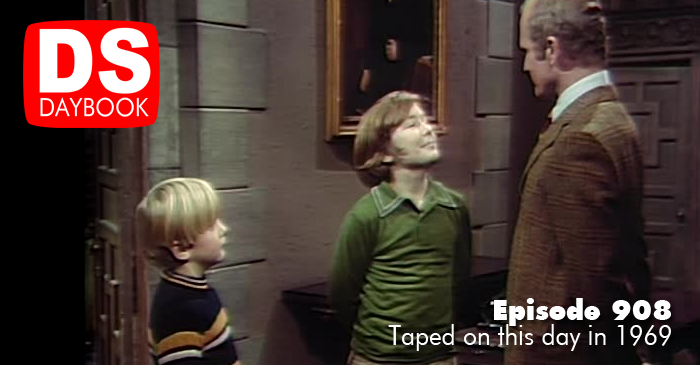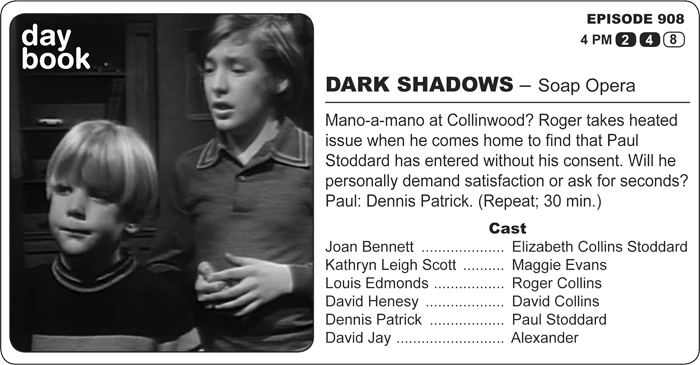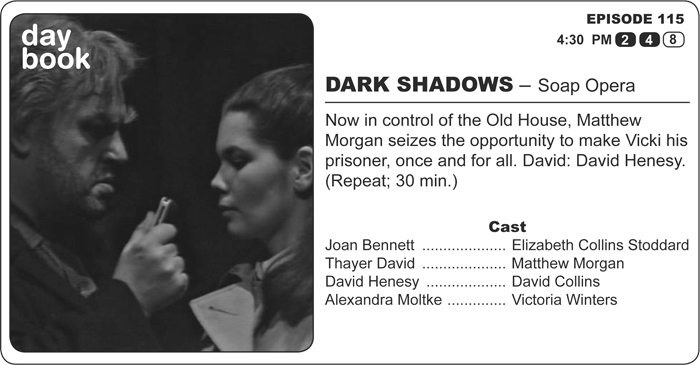
By PATRICK McCRAY
Taped on this date in 1969: Episode 908
Will a stolen radio help Paul recruit Maggie in his campaign against the Leviathans, or will Liz outwit him yet again? Paul: Dennis Patrick. (Repeat; 30 min.)
Paul is disturbed that Alexander is with David, but no one will listen to his warnings. Alexander subtly and unsubtly exerts control and coercion across the house, and Maggie finally believes Paul when she overhears the tot threaten David for a radio. It’s a gift from Roger, returned from out of town and incensed that Paul is back.
Paul Stoddard is easily the most deluded character on the show, but lovably so. He can no more escape the Leviathans than he can just kinda fly casual and drop back in at Collinwood to pick up like it’s the 1940’s. But he tries. In a show that fixates on the past, Paul Stoddard is no more guilty than many of the others. He’s one not-quite-murdered spouse above Elizabeth on that scale. Jason held her with threats. Paul doesn’t even need to do that. Perhaps of all of the DS repertory, I may feel sorriest for him. At a certain point, being financially dependent on Liz isn’t just emasculating, it’s dehumanizing. Yes, yes, I know, this is the position that almost all women were in back then, and we’re not talking Ward Cleaver money. We’re talking Jamison’s daughter money. The class differences must have been even more oppressive than the lack of autonomy. Collinwood’s been making people prisoners since Barnabas christened the tower room, and that Paul felt so desperate to hold his own that he made clearly unsavory bargains. He shows up at home despite the murder attempt he dodged last time because it’s the safest place he knows. If the safest place in the world is a bedroom across the hall from the woman who tried to bash your brains out the last time you saw her, life has not delivered a bouquet of Cuban cigars and vintage Playboys.
Before he gets to die, he becomes a WC Fields character -- mit shrewish wife, understanding daughter, and a marble-mouthed Baby Leroy of a bouncing baby Baal of a nemesis. You know, if that character were played by William Shatner’s frantic airline passenger in “Nightmare at 20,000 Feet.” It’s actually an eerie analogy. “I’m telling you, there’s a demonic kid with a thick, Bronx accent and he’s on the east wing of the mansion! You’ve gotta believe me!”
Who’s the stewardess? Maggie. Does she believe him? No. Until she does. All because the little satanic Sonny Jim wants a radio so he can rock out to some Roger Miller. And this, I can understand. But if there’s one thing he doesn’t count on, it’s the inconvenience of living on a set to a soap opera, loaded with crannies and landings and landed crannies designed for convenient eavesdropping. Let’s see if he gets his precious hamburger, now. Go back to yer stock cars, kid. Uncle Paul and your governess need a to take a meeting. He remembers Maggie from the New York Playboy Club, and he’s going to learn to do that Bunny Dip if it kills him. He’s friends with sailors like Jason McGuire, and survival is a dish best served with a Highball. At any point, Paul -- already established as a master of disguise -- may have to don the ears and tail to pass for one of the Club’s discipled, efficient, and charming servers. How many times did he evade Nicholas Blair that way? You tell me.
All seriousness aside, just like the arrival of Barnabas allowed Roger to lighten up and stop villaining around the joint, this latest turn for evil by Barnabas creates the opportunity for Roger to become the hero once again. Kind of. Paul’s flaky irresponsibility and gnawing regret make Roger seem like he deserves that “#1 Dad” mug that Liz pretended David picked out. So what if his secretary keeps thumbtacks in it? It’s not like David’s ever going to get a job at the cannery and catch him. Nevertheless, Roger is really earning it. He’s grown to love David, and that’s easier to do when your son stops trying to kill you by sabotaging your car. He brings him radios. Seems happy to see him. Roger gets mad, kind of on Liz’s behalf, that she’s letting her working class ex-husband smoke his Gauloises and wear his slippers without even the decency to sprinkle some Gold Bond in there. Of course, she’s a member of a cult, too, But even excluding those things, Roger is on a hero’s journey that would have even Joseph Campbell taking notes.
It’s heartening that Roger takes to being a dad far more easily than we ever thought. It’s equally heartbreaking that Paul tries to do the same thing, far, far too late.



